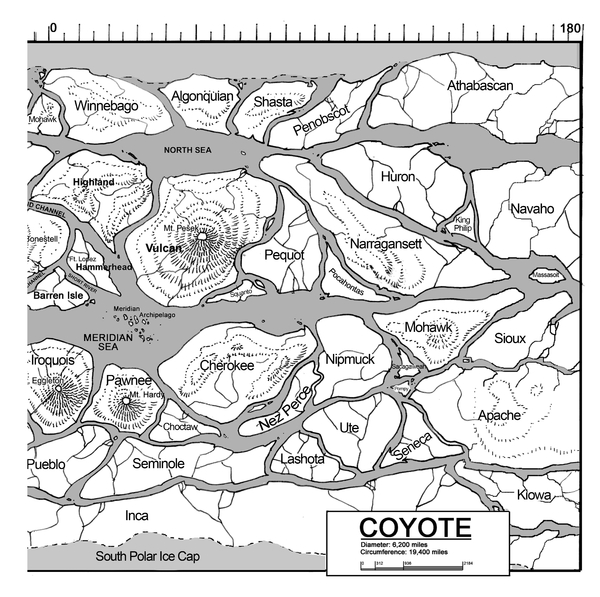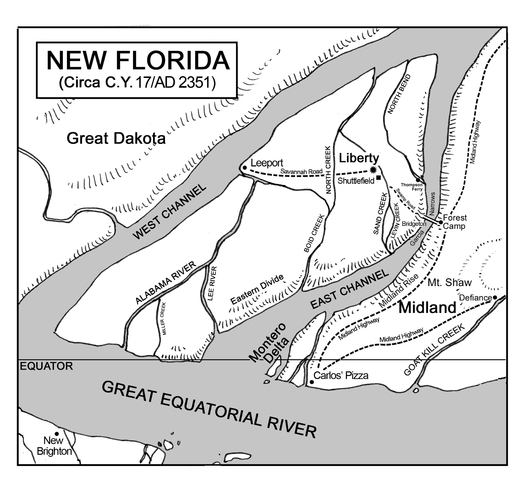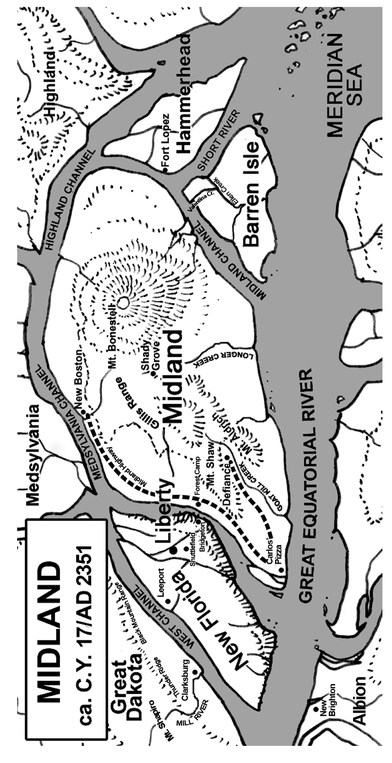Coyote Horizon (4 page)
Authors: ALLEN STEELE




Part 1
A MAN OF CONSTANT SORROW
The customs inspector sat at his desk, waiting to die.His life was not in peril. In fact, of all the jobs one could have on Coyote, his was among the safest. Nor was he terminally ill; in his midtwenties and reasonably healthy—at least in the physical sense—he would probably live sixty or seventy more years. No one had threatened him, and there was no reason for him to believe that tomorrow would be any different than today. His life was unremarkable, his existence dull and colorless.
Which was why he was waiting to die. He had nothing for which to live.
His desk was in a kiosk within the New Brighton spaceport, just past the entrance designated for arriving passengers. The desk measured four feet by two feet, and was clean except for a few items. A comp terminal, upon which abstract images swirled when it wasn’t displaying data. A biometric scanner, its lens pointed toward the partition in the transparent cube that made up the kiosk walls. Several stacks of forms, carefully arranged according to purpose and separated into trays marked IN and OUT. Three pens, one of which was missing its cap. An electronic passport stamp. A small box of tissue paper. A plastic bottle of water.
Every morning when he came to work, the first thing the inspector did was make sure that everything was in its proper place. There was seldom any change in the appearance of his desk from when he’d last seen it, unless another inspector had borrowed a pen (which was why one of them was missing its cap) or swiped some tissue paper; nonetheless, it was a way of starting the day. Reassured that all was right in his world, he would open the lower-right drawer and place inside a brown paper bag containing his lunch: a ham-and-cheese sandwich, an apple, perhaps a chocolate brownie that he’d picked up at the deli down the street from his apartment. He would then take a seat in the hard, straight-backed chair and, folding his hands together, lift his gaze to the partition, through which he could see the broad windows overlooking the landing field.
Other customs inspectors sat in identical cubes, doing the same job as he did, or stood behind adjacent tables, ready to open suitcases, trunks, and bags in search of contraband: illegal drugs, unregistered firearms, explosive materials, invasive species of flora or fauna, or anything else that might pose a risk to the health and safety of the inhabitants of the new world. He seldom spoke to any of them, though, and they’d come to accept the fact that their coworker preferred to be left alone. But they’d all noticed the thick silver band on his left wrist and recognized it for what it was: a control bracelet, the kind issued to former criminals released on parole.
He’d never told anyone the reason he had to wear it, and their supervisors refused to divulge that information. But the other inspectors were as resourceful as they were curious, and it didn’t take long for them to ferret out the background of their quiet colleague. During lunch-hour conversations in the break room—he almost always ate lunch by himself, so he was seldom among them—they sometimes discussed who he was and why he was here. And although they pitied him, or at least to the extent that anyone might express empathy for a young man with a troubled past, they also avoided him as someone who’d once committed an act of violence and who might well be provoked to do so again.
They didn’t need to worry. The customs inspector would never again harm anyone. Those who were familiar with his case—his family; the superintendent of the rehabilitation farm where he’d lived for two and a half Coyote years; the psychiatrist who’d treated him; the magistrates who’d sentenced him and, later, approved his petition for conditional parole; the influential uncle who’d arranged for him to be assigned to a work-release program—agreed that he was not a dangerous individual, and that he should be given a chance to pay his debt to society.
So the bracelet was fastened around his wrist, and a parole officer was designated to handle his case. Then he was sent to New Brighton, where he became a faceless bureaucrat performing a routine and unimaginative task. And there he sat, waiting to see what would happen next, knowing that this day would be pretty much the same as yesterday and the day before that, and that someday in the future, many years from now, he would take his last breath, and his death would come as blessed relief from a life that had long since lost any spark or flavor.
His name was Hawk Thompson, and he’d killed his father. And now he was waiting to die.
The ships came from Earth.Some days, there would be only one; others, there would be two or three. Every now and then, more would touch down, and the field would be crowded with spacecraft, parked so close together that it seemed as if their wingtips nearly touched one another. But seldom was there a time when the skies above New Brighton didn’t thunder with a sonic boom, announcing the arrival of another vessel from Earth.
Most were passenger shuttles, ferrying people down from starships in low orbit above Coyote. The spaceport was also frequently visited by freighters, big cone-shaped craft that would land at the side of the spaceport where the warehouses were located. On rare occasion, the starships themselves would come down, usually when they needed to be dry-docked for major repair; when that happened, the ground itself seemed to shake, the windows of the terminal rattling gently within their frames, as the giant vessel slowly descended upon vertical thrusters to the steel-reinforced concrete of the field.
No matter their size, purpose, or registry, though, the ships all came from the same place. Their point of origin was Highgate, the international space colony in lunar orbit above the Moon. Upon departure, they’d make the short journey to Starbridge Earth, positioned at a Lagrange point nearly a quarter of a million miles away. Once traffic controllers aboard the starbridge gatehouse cleared the vessels for hyperspace transit, AIs would assume control of the craft from their pilots, and the ships would enter the artificial wormhole created within the center of the enormous silver ring. Five seconds later, in a burst of defocused light, they’d emerge from Starbridge Coyote, in trojan orbit around 47 Ursae Majoris-B, forty-six light-years from Earth.
A miracle of physics and engineering; Hawk was familiar with the details, but he hadn’t experienced it for himself, nor was he likely ever to do so. Born and raised on Coyote, he’d never left the world his parents had come to call home. His mother, along with his uncle, had been among the 104 colonists who’d made the long voyage to 47 Uma aboard the URSS
Alabama
, while his father had been one of those who’d been aboard the first starship built by the Western Hemisphere Union,
Seeking Glorious Destiny Among the Stars for Greater Good of Social Collectivism.
His parents had been very young when they’d left Earth; the stories they’d told him about their early lives were based upon recollections that had faded with the years, until Earth had become little more than a vague childhood memory. To be sure, Uncle Carlos and Aunt Wendy had been back there, shortly after the starbridge was established, and they had served as Coyote’s first emissaries to the United Nations. As far as Hawk was concerned, though, the place to which they’d gone was as mythical as Heaven, Asgard, or Nirvana.
Alabama
, while his father had been one of those who’d been aboard the first starship built by the Western Hemisphere Union,
Seeking Glorious Destiny Among the Stars for Greater Good of Social Collectivism.
His parents had been very young when they’d left Earth; the stories they’d told him about their early lives were based upon recollections that had faded with the years, until Earth had become little more than a vague childhood memory. To be sure, Uncle Carlos and Aunt Wendy had been back there, shortly after the starbridge was established, and they had served as Coyote’s first emissaries to the United Nations. As far as Hawk was concerned, though, the place to which they’d gone was as mythical as Heaven, Asgard, or Nirvana.
So the ships from Earth would come, their arrival heralded by thunder and flame, and once the dust settled around the landing gear, their passengers would march down lowered gangway ramps and make their way to the terminal. The very first person they’d meet on Coyote would be the customs inspector who’d process them through passport control. And if they happened to pick the middle of three kiosks, that inspector would be Hawk himself.
Hawk would sit at his desk while the passengers, obeying multilingual holos floating above the floor, entered roped-off queues to take their turn at his kiosk. He kept his expression carefully neutral, showing neither pleasure nor disapproval, and once they approached his window, he’d ask the same set of questions.
Name, please?
Passport and visa?
Citizen of the Coyote Federation or nonresident?
And if it was the latter . . .
Reason for visiting?
Expected length of stay?
Are you bringing in any items valued above one hundred colonials?
And in the meantime, while he checked their papers and listened to their answers, the biometric scanner would examine their faces, matching their profiles against a database of known criminals. On the rare occasion that the database tagged someone as persona non grata, his comp would alert him and he’d surreptitiously press the small button beneath his desktop that would alert the proctor seated nearby that here was a person who needed to be pulled aside for questioning and possible arrest. But this seldom occurred; most of the time, the people who came off the ships had clean records, or at least so far as Earth’s law-enforcement agencies were aware, and what they did after they had gone through passport control was none of his concern.
In the six months that he’d been at this job, Hawk had seen all kinds on the other side of his window. Indeed, it had become something of a private game, figuring out who they were and why they were here even before he asked his questions. If they wore expensive clothes and carried heavy suitcases, then they were tourists, usually wealthy, who’d come to Coyote for a vacation that might last anywhere between two weeks and a season. If they were well dressed, with only one or two light bags, then they were probably business travelers here for no more than six weeks, or however long it would take for them to conclude whatever deals they were trying to make. The ones who came off small, private ships and had a certain air of privilege were usually government officials—ambassadors, trade emissaries, general consuls, and the like—arriving to take up posts at embassies on New Florida. And every so often, he’d get someone who didn’t fit one of the usual profiles. Celebrities, their entourages in tow, coming to make a vid, research a novel, or simply get away from the press for a while. Missionaries from one religion or another, determined to bring the word of God to the heathens of the new world. Now and then, nervous smugglers, trying hard to pass for normal while sweating out the drugs, liquor, or guns hidden in their bags.
More often than not, though, the people he met were immigrants.
They were the easiest to identify. Their clothes were plain, sometimes threadbare, and usually looked as if they’d been worn for days. Their bags and trunks were overstuffed, and Hawk knew that, if he were to watch them being unpacked at the nearby inspection tables, he’d see precious mementos and keepsakes from the life they’d left behind. And they were almost never alone, but were accompanied by husbands or wives, or children, or relatives, or lifelong friends.
But what really set them apart was the look in their eyes. Like everyone else on Coyote, Hawk had heard stories about how badly things on Earth had deteriorated. Not just environmental collapse—glaciers in northern Europe, desertification of the American heartland, catastrophic floods in the Middle East and Southeast Asia, widespread drought across much of Africa, Australia, and South America—but also the gradual breakdown of human civilization as a result of global climate change. The Western Hemisphere Union was crippled, its system of social collectivism buckling under the strain of having too many mouths to feed. The European Alliance wasn’t faring much better; the great cities of London, Paris, Amsterdam, and Moscow were emptying out, their former residents fleeing south to places like Rome, Athens, and Istanbul, which themselves were struggling with the huge influx of refugees. The Pacific Coalition had all but lapsed into anarchy, with nearly a third of its population reduced to living on anchored ships and barges, while the nations of the southern hemisphere had become a patchwork of city-states, ranging from fundamentalist theocracies to military dictatorships.
Other books
Heat by K. T. Fisher
Violet is Blue (Hothouse series) by Stokes, Tawny, Anna, Vivi
Bite Me (The Transfigured Ones Book 2) by Michelle Roth
Suffer Love by Ashley Herring Blake
The Broken Triangle by Davitt, Jane, Snow, Alexa
Retribution: The Augmented Human Rebellion - Book 2 by Lefler, Terry
Thicker Than Soup by Kathryn Joyce
Welcome to the Funny Farm by Karen Scalf Linamen
Stranded Mage by D.W. Jackson
Antebellum BK 1 by Jeffry S.Hepple
